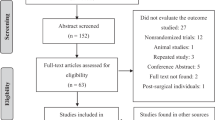Abstract
The cancer anorexia/weight loss syndrome is a major source of distress for patients with advanced, refractory cancer. This syndrome is associated with an early demise and a decline in quality of life. Initial laboratory and clinical phase II data suggest that eicosapentaenoic acid supplements may mitigate some aspects of this syndrome. However, recent phase III data are less promising. This review discusses several of these studies and points out some of the pitfalls encountered in clinical trials that focus on the cancer anorexia/weight loss syndrome.
Similar content being viewed by others
References
Baracos VE, DeVivo C, Hoyle DH et al. 1995. Activation of the ATP-ubiquitin-proteasome pathway in skeletal muscle of cachectic rats bearing a hepatoma. Am J Physiol, 268(5 Pt 1):E996–1006.
Barber MD, Ross JA, Voss AC et al. 1999. The effect of an oral nutritional supplement enriched with fish oil on weight-loss in patients with pancreatic cancer. Br J Cancer, 81:80–6.
Bruera E, Strasser F, Palmer JL et al. 2003. Effect offish oil on appetite and other symptoms in patients with advanced cancer and anorexia/cachexia: a double blind, placebo controlled study. J Clin Oncol, 21: 129–34.
Dewys WD, Begg C, Lavin PT et al. 1980. Prognostic effect of weight loss prior to chemotherapy in cancer patients. Am J Med, 69:491–7.
Fearon KC, von Meyenfeldt MF, Moses AG et al. 2001. Effect of a protein and energy dense n-3 fatty acid enriched oral supplement on loss of weight and lean tissue in cancer cachexia: a randomised double blind trial. Gut, 52:1479–86.
Finkelstein DM, Cassileth BR, Bonomi PD et al. 1988. A pilot study of the Functional Living Index (FLIC) scale for the assessment of quality of life for metastatic lung cancer patients: an Eastern Cooperative Oncology Group study. Am J Clin Oncol, 11:630–3.
Gogos CA, Ginopoulos P, Salsa B et al. 1998. Dietary omega-3 polyunsaturated fatty acids plus vitamin E restore immune deficiency and prolong survival for severely ill patients with generalized malignancy. Cancer, 82:395–402.
Jatoi A, Kumar S, Sloan JA et al. 2000. On appetite and its loss. J Clin Oncol, 18:2930–2.
Jatoi A, Loprinzi CL. 2001. Current management of cancer-associated anorexia and weight loss. Oncology, 15:497–502.
Jatoi A, Rowland KM, Loprinzi CL et al. 2003. An eicosapentaenoic acid-enriched supplement versus megestrol acetate versus both for patients with cancer-associated wasting. A collaborative effort from the North Central Cancer Treatment Group and the National Cancer Institute of Canada. Proceedings of the American Society of Clinical Oncology nr 2987. San Fransisco, USA: American Society of Clinical Oncology.
Loprinzi CL, Ellison NM, Schaid DJ et al. 1990. Controlled trial of megestrol acetate for the treatment of cancer anorexia and cachexia. J Natl Cancer Inst, 82:1127–32.
Loprinzi CL, Laurie JA, Wieand HS et al. 1994. Prospective evaluation of prognostic variables from patient-completed questionnaires. North Central Cancer Treatment Group. J Clin Oncol, 12:601–7.
Rosenberg IH. 2002. Fish-food to calm the heart. N Engl J Med, 346: 1102–3.
Smith HJ, Lorite MJ, Tisdale MJ. 1999. Effect of a cancer cachectic factor on protein synthesis/degradation in murine C2C12 myoblasts: modulation by eicosapentaenoic acid. Cancer Res, 59:5507–13.
Tamburini M, Brunelli C, Rosso S et al. 1996. Prognostic value of quality of life scores in terminal cancer patients. J Pain Symptom Manag, 11:32–41.
Todorov P, Cariuk P, McDevitt T et al. 1996. Characterization of a cancer cachectic factor. Nature, 379:739–42.
Whitehouse AS, Smith HJ, Drake JL et al. 2001. Mechanism of attenuation of skeletal muscle protein catabolism in cancer cachexia by eicosapentaenoic acid. Cancer Res, 61:3604–9.
Wigmore SJ, Fearon KCH, Maingay JP et al. 1997. Down-regulation of the acute-phase response in patients with pancreatic cancer cachexia receiving eicosapentaenoic acid is mediated via suppression of interleukin-6. Clin Sci, 92:215–21.
Author information
Authors and Affiliations
Corresponding author
Rights and permissions
About this article
Cite this article
Jatoi, A. Fat, fish oil and the cancer anorexia/weight loss syndrome: lessons learned from recent studies with eicosapentaenoic acid. Evid-Based-Integrative-Med 1, 51–55 (2004). https://doi.org/10.2165/01197065-200301010-00009
Published:
Issue Date:
DOI: https://doi.org/10.2165/01197065-200301010-00009




